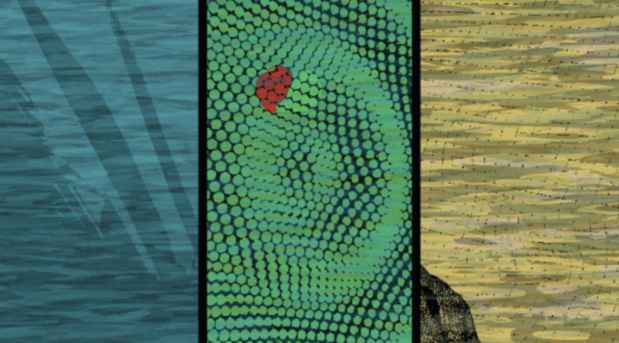Sarah Rothberg and Marina Zurkow “Wet Logic”
Bitforms Gallery

[Image: Marina Zurkow, still from "Oceans Like Us" (2020)]
This event has ended.
Wet Logic, a collaborative exhibition by Sarah Rothberg and Marina Zurkow, presents a model of the world organized according to a wet, oceanic ideology rather than a dry, land-based paradigm. This is a world that manifests the circuitous nature of time, the enmeshment of humans to the planet, and the shifting boundaries of earthly spaces. Rothberg and Zurkow present a series of systems that further human connection to oceans by way of action and imagination.
Accretions is a series of silkscreens on repurposed packaging cardboard. Zurkow describes these works as masses of consumer goods: the result of what is bought, shipped globally, and discarded over time. Accretions relate the artist’s generative animations from her series MORE&MORE, which depict the international exchange of goods via ocean freight.
Water Without Wet (WWW) by Sarah Rothberg is a VR installation that examines the atemporal qualities of water. WWW engages two audiences, the headset-user, and the spectator. The user is immersed in a virtual world, instructed to enact simulations of everyday interactions—drinking from a glass, flushing a toilet, watering a plant. The spectator watches the user simulating these actions, as well as two external displays of the virtual world. These renderings appear in different styles, from different viewpoints, and at different scales. At times chaotic and random, the procession of vignettes cycle out of the user’s control. However, their actions cause the environment to become increasingly abstract and complex. WWW disrupts linear time to mirror the fluid and expansive consciousness of oceans.
The title of Zurkow’s animation series, Oceans Like Us, uses pun and metaphor to express a desire for the ocean to love us. Part one of the series, Love Me, summons the elements that make oceans beloved: their soothing rhythms and splendiferous lifeforms, as well as our fetishistic enthusiasm for creatures both real and imagined. Milkcrate Plastisphere plunges into the deadly capitalist ocean of toxic plastics. Combining these opposites is Bow Null, a journey through the techno-ocean, buzzing with instruments of sensing, measuring, and monitoring that turn the ocean into a body to be dissected and penetrated, but also, perhaps, into a world to be known and respected.
In contrast to the wet logic of the main exhibition, the front of the gallery exists in geologic time. Geological strata can make it seem as if our impact on the earth exists in a compact layer, fixed with a linear history. In this area, Toilet Joke I, a collaborative work by both artists, overflows with reground and pelletized plastic, unable to flush away more waste. An old phone plays a video of waves: the ocean virtualized. In Study for Toilet Joke II, positioned at the back of the gallery, the water in the fishbowl is physical. Where a fishbowl normally acts as a reminder of oceanic life in the dry world, Zurkow and Rothberg position it as a microcosm of the churning plastic, suspended in an infinite flush.
Overall, the use of technology in this exhibition is purposeful in relation to its subject. The artists address the tension between dissolving, delirious immateriality and the consequences of material entanglements. Aspects of digital technology allow the artists to propose new watery philosophies—for example, the software of this exhibition is non-linear and dislocating. Technology creates an interconnected mesh of relationships in a global network. While this network invites comprehension of the world on a more-than-human scale, it is also endemic to the cycle of extraction and e-waste, engendering consumption and desire without consideration of technology’s tangible being.
This show marks the culmination of the artists’ ongoing research into the fields of environmental and blue humanities. Influential sources include Philip Steinberg and Kimberley Peters’ essay Wet Ontologies, Fluid Spaces, the artists’ first-hand investigation of ocean habitats through swimming and snorkeling, and research into plastic composition and recycling capacities.
Media
Schedule
from February 06, 2020 to March 15, 2020
Opening Reception on 2020-02-06 from 18:00 to 20:00